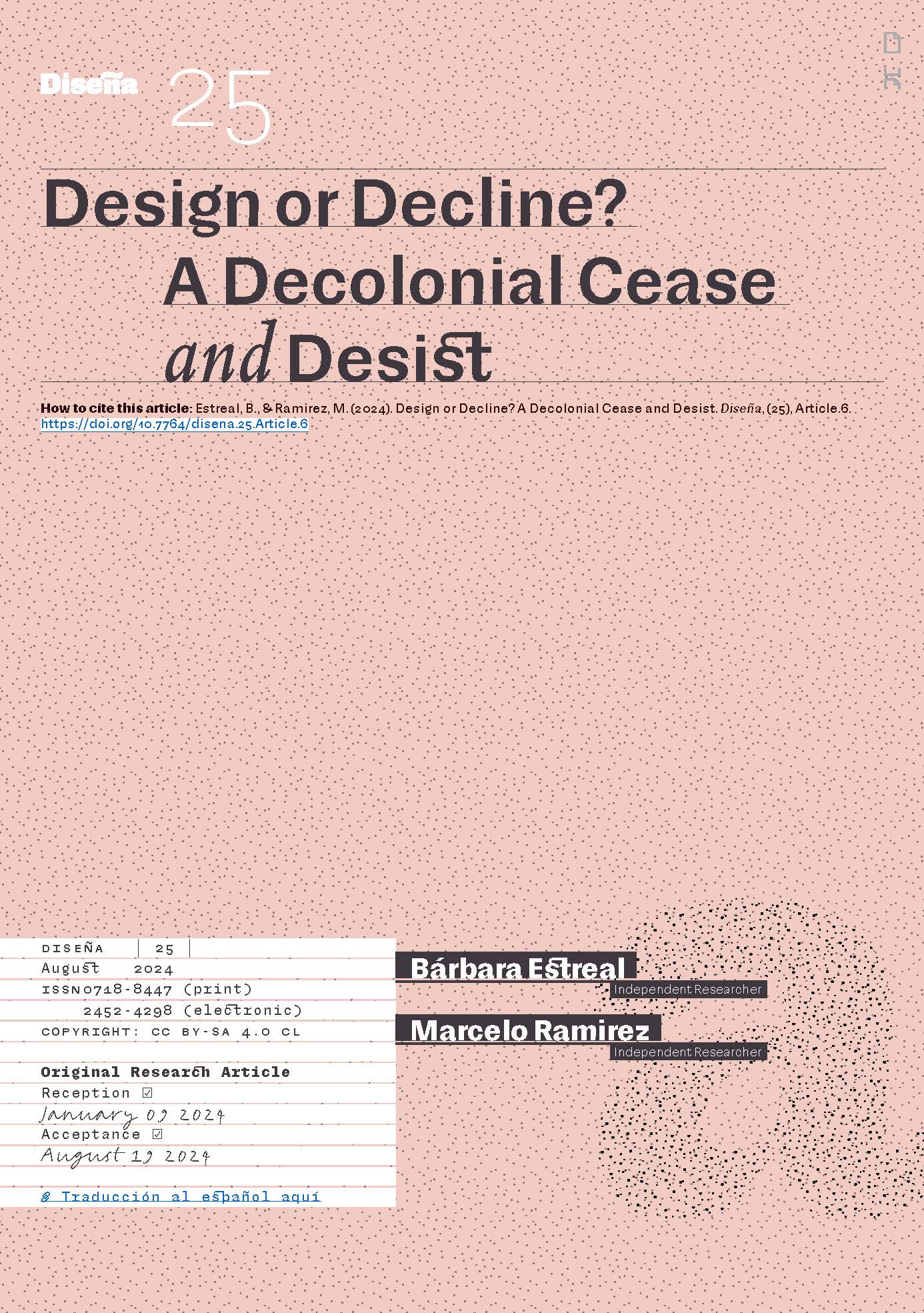Design or Decline? A Decolonial Cease and Desist
Main Article Content
Abstract
This paper critically examines the contemporary relationship between design and decolonization, with a focus on reevaluating our expectations of design as a profession and exploring potential pathways forward. The discussion centers on the stagnant state of design discourse, and the intricate power dynamics within design practices. It underscores the significance of recognizing that designers do not uniformly occupy identical positions, highlighting the asymmetrical power dynamics inherent in design nearshoring and the prioritization of Northern interests. Furthermore, it questions the reliance on exclusive designerly methods for systemic change, the pursuit of the common good, and the realization of the pluriverse. We claim that design, in its current form, often reinforces capitalist and colonial structures rather than dismantling them. The paper criticizes design’s complicity in perpetuating colonial differences while claiming to address them, recognizing the fundamental role of design for the realization of the modern project and as a key enabler of capitalist modes of production and consumption. Through an interdisciplinary lens, this paper scrutinizes the dissonance between design’s self-professed ethical values and the pursuit of capitalistic gains.
Downloads
Article Details

This work is licensed under a Creative Commons Attribution-ShareAlike 4.0 International License.

This work is licensed under a Creative Commons Attribution-ShareAlike 4.0 International license.
COPYRIGHT NOTICE
All contents of this electronic edition are distributed under the Creative Commons license of "Attribution-ShareAlike 4.0 Internacional" (CC-BY-SA). Any total or partial reproduction of the material must mention its origin.
The rights of the published images belong to their authors, who grant to Diseña the license for its use. The management of the permits and the authorization of the publication of the images (or of any material) that contains copyright and its consequent rights of reproduction in this publication is the sole responsibility of the authors of the articles.
References
Ahmed, S. (2018, June 28). Refusal, Resignation and Complaint. Feministkilljoys. https://feministkilljoys.com/2018/06/28/refusal-resignation-and-complaint/
Bloom, E. (2022, March 24). Space10 Pops Up in Mexico City. A Two-week Festival Exploring What Good Design Is in Today’s Climate. What Design Can Do. https://www.whatdesigncando.com/stories/space10-two-week-design-festival-in-mexico-city/
Bonsiepe, G. (1993). Las siete columnas del diseño. Universidad Autónoma Metropolitana Azcapotzalco.
British Council Mexico. (n.d.). Crafting Futures Mexico. https://www.britishcouncil.org.mx/en/crafting-futures-mexico
Design Matters. (2024). A Digital Design Conference. https://designmatters.mx/themes/
Fry, T. (2007). Redirective Practice: An Elaboration. Design Philosophy Papers, 5(1), 5–20. https://doi.org/10.2752/144871307X13966292017072
Institute Français d’Amérique Latine. (n.d.). Francia en México: Programme d’immersion design et métiers d’art. https://designweekmexico.com/convocatorias/francia-en-mexico/
Lang, P., & Menking, W. (2003). Superstudio: Life Without Objects. Skira.
Lorusso, S. (2024). What Design Can’t Do: Essays on Design and Disillusion. Set Margins’.
Maldonado, T. (1972). Design, Nature, and Revolution: Toward a Critical Ecology. Harper & Row.
Maseda, P. (2006). Los inicios de la profesión del diseño en México: Genealogía de sus incidentes. CONACULTA.
Matos, A. (Ed.). (2022). Who Can Afford to Be Critical?: An Inquiry into What We Can’t Do Alone, as Designers, and into What We Might Be Able to Do Together, as People. Set Margins’.
Medina Lozano, L. (2016). La arquitectura en México en los años 50 vista desde el cine mexicano. In A. González Barroso, Á. Román Gutiérrez, & N. Gutiérrez Hernández (Eds.), Miradas al cine desde Zacatecas (pp. 102–111). Universidad Autónoma de Zacatecas. https://doi.org/10.48779/63yj-qv84
Quijano, A. (2000). Coloniality of Power and Eurocentrism in Latin America. International Sociology, 15(2), 215–232. https://doi.org/10.1177/0268580900015002005
Tonkinwise, C. (2013). Design Away: Unmaking Things [Draft]. https://www.academia.edu/3794815/Design_Away_Unmaking_Things

